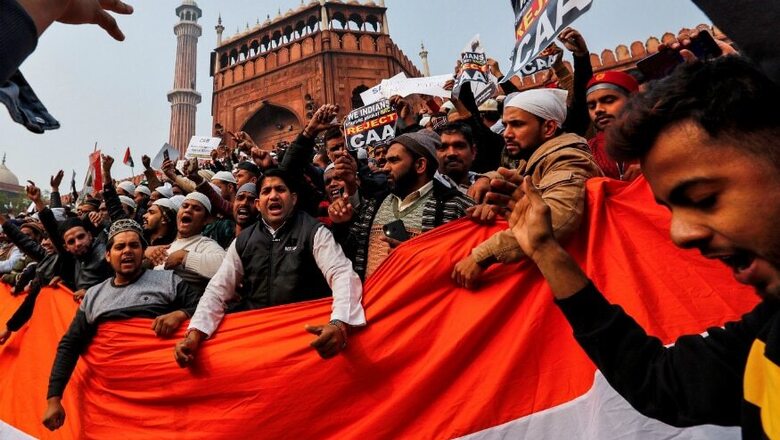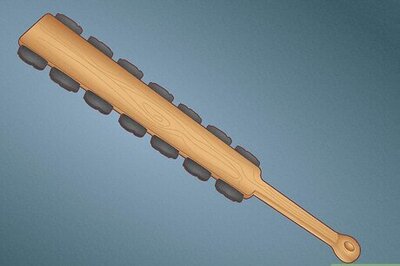
views
The ongoing stir over NRC and the Citizenship Amendment Act has provided a fabulous opportunity to Indian Muslims to reassert their Indian identity in great style, with support from the Hindu-Sikh-Christian-Parsi-Jain fraternity, activists, marginalised sections, artistes, intellectuals, Bollywood stars and authors.
The new Muslim assertiveness revolves around the tiranga (tricolour), ahimsa (non-violence) and Jana Gana Mana, the national anthem. In a swift and collective sense, the CAA-NRC protests have seen the rejection of politically inclined Muslim clergy, politicians, intellectuals and others who, for decades, had sought to showcase themselves as ‘true’ representatives of the Muslim community.
While it is still unclear which way the current movement is headed, clearly, Muslims have put their heart and soul into it.
There are compelling reasons for it too. Unlike instant triple talaq, Article 370 and the Ayodhya verdict, the political flavour of CAA-NRC has made every Muslim, cutting across regional, linguistic, sectarian and economic lines, sit up. There is a uniform sense that their sense of Indian-ness is being questioned and a collective, peaceful, collaborated response is required.
In this context, it should be understood why CAA-NRC protest is different from other issues.
On instant triple talaq, the opinion among Muslims in India was sharply divided on gender and sectarian lines. On Article 370, there was a psychological distance with the Kashmir issue, while in the case of the Ram Janmabhoomi-Babri masjid dispute, a large number of Muslims had viewed it as fait accompli.
After the November 9 Supreme court verdict, there was a sense of relief and no support for those contemplating a review petition.
Indian Muslims have a profound sense of belonging to their motherland, having deep roots in their faith and psyche. For any discerning observer, the unity of purpose among Jamia Millia Islamia and Aligarh Muslim University (AMU) should be worth noticing.
Jamia was born on Mahatma Gandhi’s call as a nationalist answer to AMU, which, in pre-independent India, had some pro-Pakistan elements. Zakir Hussain, along two illustrious persons working in Germany then, Dr. Abid Husain and Mohammad Mujeeb, returned to India to work for Jamia.
Apart from sacrificing their lucrative careers, the trio, for over 20 years between 1926 and 1948 did not draw salaries and spent their savings and wealth to tide over great financial crisis to fight ideological issues and propagate nayi taleem (modern education). It was a pity and matter of shame that Zakir sahib’s grandson Salman Khurshid failed to speak up during the CAA-NRC stir or articulate these issues which have faded away from the public memory.
Contrary to an erroneous and inaccurate narrative presented today, a majority of Muslims in pre-independent India were opposed to the two-nation theory and the creation of Pakistan.
The All India Momin Conference’s 1943 resolution representing backward castes among Muslims — mostly craftsmen, artisans and labourers — had read, “Patriotism and nationalism of the Indian mussalmans will never tolerate vivisection of our dear motherland into several hostile states.”
Maulana Hussain Ahmed Madani’s idea of composite nationalism was based on the Quran and the Hadith (sayings of Prophet Mohammad). Maulana Madani advanced the “theory of territorial national-hood”, saying that it is “not necessary that a nation, to be a nation, should share the same religion and culture” arguing that Muslims could live as observant Muslims in a multi-religious, multi-cultural, pluralistic society where they would be full citizens of an independent, secular India.
Madani's criticism of the two-nation theory was based on his assumption that Muslims did not constitute a qawm (nation) different from non-Muslim Indians. He argued that in the Quran and in the practice of Prophet Muhammad, the term qawm had a non-religious connotation.
As author-scholar Shamsul Islam mentioned in his book Muslims Against Partition, pre-independent India had restricted franchise which excluded mass of peasants, women, majority of small shop-keepers, traders who were not taxpayers, owned property or had high educational qualifications.
“Only 28.5 per cent of adult population of the provinces could vote in the provincial assembly elections of 1946. Economically and socially depressed portions were virtually disfranchised… for example in Bihar, the electorate consists of merely 7.8 per cent of the total population,” Islam wrote while rolling out statistics to marshal his argument that the idea of Muslim League being sole representative of Muslims was based on shaky grounds.
Patriotic Muslims, in spite of having numerical strength, failed in united India’s cause due to their inability to organise masses, a sustained machination from the British, a section of the Congress and Right-wing Hindu radical outfits like the RSS and Hindu Mahasabha, and due to the Muslim League’s reign of terror. The Muslim League had created a quasi-military called Muslim National Guards, numbering over 3,00,000 in 1931 to instil fear. These “volunteers” physically attacked Maulana Abul kalam Azad, Dr Saifuddin Kitchlew, Maulana Hussain Ahmad Madani, Maulana Hifzur Rahman and many others.
The Congress can be held guilty of negotiating the partition of India with the Muslim League as though it was the only representative of the voice of the Muslims. Mahatma Gandhi, too, committed a folly of sorts when he addressed Jinnah as “Qaid-e-Azam” in his correspondence with the Muslim League leader.
Against this backdrop, it should be understood why Muslims of present-day India are determined to speak up for themselves and not repeat the follies of partition when their voice was not heard in the din.
A strong manifestation of India-first among Indian Muslims offers an opportunity for all politicians and political parties to bury the old paradigm and make a new beginning based upon mutual trust, constitutional democracy and equality. Are there any takers?
(The author is a visiting Fellow with the Observer Research Foundation.)














Comments
0 comment